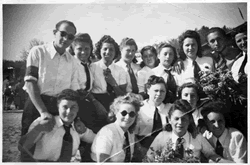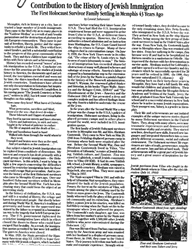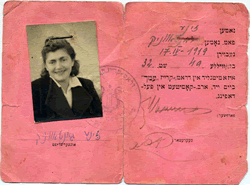1. Zinas' card in the ghetto ( Written in Yiddish)

2. Zina ( 4 from the left top) with friends

3. A news paper story about Zina and her family after the war.
Zina Gontownik
Taken from;
http://www.tennesseeholocaustcommission.org/livingon/biographies/survivors.php?all=Survivor&Submit=Submit
Memphis, Tennessee
Born: 1916 Lybeshuk, Poland (Now Lybiskiai, Lithuania)
Survivor: Wilno ghetto; Kaiserwald, Stutthof, and Mühldorf-Dachau
Concentration Camps
"One day in the ghetto, the Nazis announced that all children were to
be examined by German doctors," remembers Zina Gontownik. "I dressed
my baby girl, Chaya, in her best clothes and hat. They wouldn't let us
go with the children so I let my baby go, praying for a good medical
report. It was the next day before we learned that the Nazis had
thrown the children from trucks into ditches and set fire to them.
Their screams were drowned out by music the Nazis played."
Report to Yad Vashem by Joseph
Chaya Gontownik was born in Vilnius, Poland in 1939 to Abraham and
Zina nee Kuszel. She was a child. Prior to WWII she lived in Vilnius,
Poland. During the war was in Vilnius, Poland. Chaya perished in 1942
in Vilnius, Poland at the age of 3. This information is based on a
Page of Testimony (displayed to the left) submitted by her brother
from United states
In the summer of 1943 Zina and her husband were separated. He was
taken to a work camp near the front line with Russia. She and her
sister were transported to Kaiserwald, in Latvia; to Stutthof, in
Poland; and finally to Mühldorf, a subcamp of Dachau, in Germany.
Zina's husband and twenty-two other Jewish inmates escaped the
Germans. He was captured by an advance guard from Russian Army
intelligence, which was investigating and monitoring Nazi troop
movements. He fought with them for the remainder of the war.
Zina and her sister, liberated by the American Army in April 1945,
were transported to Feldafing, a displaced persons' camp in Germany.
There a Jewish chaplain assisted them in getting in touch with family
in Memphis, Tennessee. Through letters she learned that her husband
and brother had survived. They were reunited two years later.
